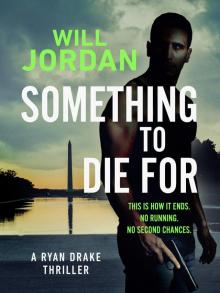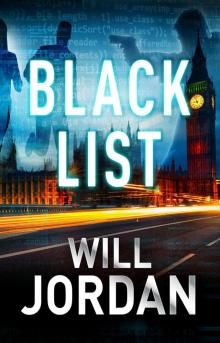- Home
- Will Jordan
Something to Die For Page 2
Something to Die For Read online
Page 2
The immeasurable complexity of the planning and preparation needed for something like this almost defied belief. Engineering a coup in just a single country required an immense effort, but to trigger simultaneous revolutions across an entire continent was on a whole other level.
Jessica was pondering the same thought, albeit from a different point of view. ‘If this is all true, someone would have discovered them before now. Someone would have leaked it online. They can’t silence everyone.’
‘They don’t need to. Do you have any idea how many bullshit conspiracy theories are floating around out there? How many nutcases spend their days ranting and raving about this stuff?’
‘Like you, you mean?’
Drake gave her a disapproving look. ‘If they control the right people, they can influence the flow of information online. They can make sure only their version of the truth gets spread and amplified, and everything else gets shut down or silenced.’
‘How do you know?’
Drake looked at his sister frankly. ‘I worked for the CIA, Jess. People don’t care about the truth anymore – they care about reinforcing what they already believe. Give them that, the rest takes care of itself.’
Like a herd of animals, all it took was a little manipulation at the right place and time to get them moving.
Jessica shook her head, dismissing that for now. ‘And you’re seriously telling me that Mum… our mother, Freya Shaw, was part of this group?’
Drake looked at his sister hard. He understood her anger, and her doubts. He’d harboured both in his time. But that didn’t mean he was wrong.
‘Yes.’
‘Why?’
‘That’s what I’m here to find out.’
Jessica laid her mug down and folded her arms. ‘Go on.’
Reaching into his coat pocket, Drake laid an object on the table with an audible thump. A key, highly unusual in design, with three blades instead of just one. A series of numbers had been carefully etched into all three sides.
‘Very pretty,’ Jessica observed dryly. ‘What does it open?’
‘That’s what I’ve been trying to figure out. There were no instructions about where to use it. No map, no directions, nothing. Just her letter to me.’
The brief missive, written by his mother shortly before her death, had been more of a personal apology to him and an effort to provide closure than any kind of instructional document. It mentioned no places or individuals for him to seek out. Or so he’d believed.
‘The answer was in front of me the whole time, only I didn’t make the connection,’ he said, holding up the key for inspection. Abandoning her position on the far side of the room, Jessica moved in beside him, examining the unusual device.
‘What do you think the numbers mean?’
‘It’s a code. And to break the code, all you need is the right cipher.’ Drake looked at her. ‘Do you still have the letter she left me?’
Believing the document had only sentimental value, Drake had left it in his sister’s care when he departed. Only recently had he seen the error of his decision, his failure to recognise that both items were required. That mistake had cost him a great deal of time.
Now, perhaps, he was on the brink of finding his answers.
Jessica didn’t respond. Instead, she turned away abruptly and moved over to the kitchen window, staring out at the rolling hills beyond.
‘Talk to me, Jess,’ he urged. ‘What’s wrong?’
‘I’m so sorry, Ryan,’ she said in a small voice. ‘It’s gone.’
Drake could barely process what he was hearing. ‘What?’
‘I burned it,’ she admitted.
‘Why would you do that?’
She turned reluctantly to face her brother. ‘Like I said, I thought you were dead. I made myself believe it. The letter was the last thing you gave to me, the last reminder I had of you. Burning it was my way of… letting you go.’
Drake slumped back in his chair, defeated.
‘I never imagined you’d come looking for it,’ his sister said, trying hard to explain herself. ‘I thought it was over. I thought you were gone.’
Drake barely heard her words.
‘Then this was all for nothing,’ he said quietly.
The key and the letter were both needed to decipher his mother’s final message. Without one, the other was useless.
He felt her hand on his, could hear the pain and regret in her voice when she spoke. ‘I’m so sorry, Ryan.’
Drake shook his head. ‘It’s not your fault,’ he finally conceded. ‘I’ve asked enough of you already. This one was on me.’
‘But without the letter… what will you do now?’
Drake didn’t answer for a while. Then, suddenly, he rose to his feet. ‘Is Dad’s car still in the garage?’
Jessica frowned, caught off guard by the question. ‘Well, yeah…’
He nodded. ‘Come with me.’
Chapter 2
Abbottabad, Pakistan
Bashir Shirani ascended the house’s steep internal staircase with slow and deliberate care, the cups and pot of tea on his tray rattling slightly with each step.
The Master, the man around whom the entire household revolved, was a creature of routine for whom any change or delay was greatly aggravating. And, as the newest member of the staff assigned to attend him, the last thing Shirani wished was to incur his displeasure.
Hearing rapid footsteps and laughter below, the young man glanced over his shoulder as two boys charged along the short corridor at the base of the stairs, shouting and laughing as they rushed outside to play in the courtyard. The Master had fathered upwards of twenty children in his life, nine of whom resided in this compound. Many were young and boisterous, and not above playing pranks on their father’s servants.
Fortunately, they were more intent on their own games than harassing him today, and he gratefully resumed his climb.
The top two floors of the main house were a private space reserved for the Master and his large family, though he would frequently hold meetings with his entourage there too. As Shirani reached the top of the stairs, he heard women’s voices in one of the rooms beyond. It sounded like two of the Master’s wives – he had three in all – engaged in some domestic discussion. He thought it might be Siham and Khairiah, since they had been with him the longest and tended to spend more time together.
His suspicions were confirmed when he entered the main living space on the top floor. Siham and Khairiah were there, talking softly as they laid out freshly laundered bedsheets, practising the same mundane routine they had performed thousands of times before.
Shirani admired them in a way. They had been with the Master more than half his life, travelling the world with him, remaining loyal and steadfast no matter the difficulties and dangers. Their lives had been neither short nor peaceful – a fact that was plain to see in their lined faces and greying hair. And yet they found a way to go on, to do what was expected of them.
‘As-salāmuʿalaykum,’ Shirani said, bowing in respect to the pair.
In Islamic culture, women were expected to be modest and deferential to men, especially in public. But within the confines of their own home it was a different matter. Men might have ruled the family, but it was generally accepted that women ruled the home. And nowhere was that more apparent than here in Waziristan Haveli.
‘Waʿalaykumu s-salām,’ Khairiah said, giving him the traditional response.
‘I have brought tea, if he wishes it.’
Shirani had been explicitly instructed not to presume anything of the Master. Meals and refreshments were to be offered or suggested, but never in a way that implied obligation. To do so would be seen as highly disrespectful.
Khairiah nodded without much interest and gestured to the doorway opposite, which led into the Master’s private chamber.
‘He is in there.’
Approaching the door, Shirani paused to compose himself, then knocked lightly.
�
��Come,’ a soft male voice called.
Opening the door, Shirani stepped inside.
The room beyond was small, sparsely furnished but cluttered with haphazardly installed electronic gear. There was nothing in the way of decoration or frivolity. The Master eschewed luxuries of any kind, despite his wealthy and privileged upbringing, preferring a simple and austere existence.
His personal workspace was, like much of the rest of the house, dimly lit by artificial lights. There was only one small window, and it remained firmly closed and shuttered.
This modest space was the Master’s inner sanctum, functioning as a study, office, meeting room and occasional recording studio, where he would dictate messages to his followers. Shirani himself had never witnessed this, but he had heard rumours that such endeavours were fraught with difficulty. Neither a charismatic personality nor an accomplished orator, the Master delivered his abbreviated messages haltingly into the camera, pausing frequently, stumbling over his words and sometimes losing his train of thought, often requiring many takes before he was satisfied with the result.
Now he was seated on a low chair at the centre of this haphazard workspace, a blanket draped over his shoulders, his attention focussed on the old-fashioned TV set in the corner. The compound had no phone lines or internet access, but it did have satellite TV reception. The unit was tuned to the Al Jazeera news network, covering the unfolding civil war in Libya.
‘As-salāmuʿalaykum,’ Shirani began, opening with the traditional greeting. He paused, waiting for a response.
There was none. The Master carried on with his viewing, apparently uninterested in the new arrival.
‘I have brought tea, Master,’ he ventured. ‘If it would please you.’
Only then did he finally garner a response.
‘Remarkable, isn’t it?’ the Master murmured, his voice soft and quiet, almost weak.
Shirani frowned. ‘Master?’
The blanket stirred, the head turned as the Master looked at him. Shirani took in the familiar visage; the face seen on countless TV screens, websites and posters all across the world. The long prominent nose, the dark, deep-set eyes, the high forehead, the thick beard.
A man that most people in the Western world would gladly see dead.
And yet Shirani wondered how many of those people would even recognise the man seated before him now. The beard and hair had long since turned grey – he was still vain enough to dye it for his TV recordings – the eyes and cheeks were sunken, the face and brow deeply lined. Always tall and slender, he had lost weight during his self-imposed captivity and looked pale and sickly. Hunted and hated for almost a decade, the Master was a man old and frail before his time.
‘This business in Libya,’ he said, gesturing to the TV, which showed images of the embattled dictator Colonel Gaddafi addressing a crowd in Tripoli. ‘Can you believe, that old fool actually blames me for the revolution in his country? He says I have armed his country’s young people with guns and drugs, and turned them against him. Ha!’ he snorted in grim amusement. ‘What do you think of that, boy?’
Shirani resisted the urge to swallow, to shrink back from his penetrating stare. Suddenly the Master didn’t look like a frail old man huddled beneath a blanket. He looked like the powerful, imposing figure who had fought the Soviets in Afghanistan, masterminded the attacks that had shattered American confidence and arrogance forever, and led a global jihad against Western imperialism for over a decade.
This man now wanted to know what he thought.
‘I think the problems in Libya are of their own making,’ he said carefully.
‘Exactly, boy. Exactly,’ the Master said as he sank back in his chair, satisfied with that answer. ‘Gaddafi is too busy with his whoring and vanity to even notice his own people. And to think, such a man dares to call himself a Muslim.’ The fire seemed to leap up behind his eyes in that moment. ‘A fool. He has dug his own grave, and soon he will lie in it, I think.’
He paused, as if the tirade had left him weary, then looked at the tray in Shirani’s hands. ‘You’ve brought tea, then?’
‘I have, Master.’
He nodded. ‘Good, good. Then let us drink it before it grows cold.’
Setting down the tray on a small table beside his chair, Shirani poured a cup. His hand trembled a little as he worked; something that didn’t go unnoticed.
‘You’re nervous, boy?’
Shirani avoided his gaze. ‘It is… a great honour to be in your presence.’
‘And you’re worried I’ll have you killed if you say the wrong thing?’
Shirani glanced at him in fright. But the dark eyes didn’t seem so intense or penetrating now. There was a flicker of warmth and amusement in them.
‘Though I may have to do something if you don’t stop pouring.’
Shirani looked down and was shocked to see tea spilling over the rim of the cup. With a gasp of dismay, he pulled the pot away.
‘Apologies, Master,’ he gasped, bowing in supplication. ‘Forgive me.’
‘There is nothing to forgive,’ the Master assured him. ‘I’m an old man with little to do. I must take my fun where I can find it.’
He raised the overfull cup and took a sip, nodding appreciatively.
‘It is good.’
‘I’m glad it pleases you, Master.’ Shirani hesitated. ‘Is there anything else?’
The older man smiled and shook his head. ‘I have put you through enough for one day, I think. You can go now.’
Shirani bowed again and was gratefully retreating from the room when the Master spoke up again.
‘What is your name, boy?’
‘Shirani. Bashir Shirani.’
‘Shirani.’ He thought on that. ‘A good Pashtun name. From Khost, yes?’
‘Yes,’ Shirani said, surprised.
The Master nodded. ‘Good fighters from Khost. I knew many during the war. They died like men.’
Saying nothing further, he turned his attention back to the TV and settled himself in his chair.
* * *
What neither man knew at that moment was that the area was being covertly observed. Cruising about 30,000 feet overhead at just under 200mph, was a single MQ-9 Reaper unmanned drone.
A pair of bulky 500-pound Paveway II laser-guided bombs hung from the wing pylons, ready to be deployed at the press of a button, and accurate enough to drop down the shaft of a well. Each one contained enough explosive power to reduce the fortified house to a heap of smouldering rubble.
And yet the aircraft’s pilot, Josh Irvine, seated in an air-conditioned ground control centre hundreds of miles away at Bagram Air Base in Afghanistan, made no attempt to deploy this ordinance. Instead he leaned back a little in his chair, taking a sip of coffee from the steaming mug beside him as he surveyed the feeds from the drone’s sophisticated Multi-Spectral Targeting System.
His job was not only to pilot the Reaper, but also to diligently record everything that it saw. And what it saw painted an interesting picture. Routine, they had soon come to realise, was of great importance there. Someone always emerged from the house at the same time each day, always bearing an empty tea tray. The man they were serving was clearly a creature of habit.
Irvine could almost imagine him at that moment, sipping his drink, believing himself safe inside his concrete prison. He glanced at the control column mounted in the centre of his drone terminal. The Reaper was orbiting the target area on autopilot, its sophisticated package of cameras and sensors constantly readjusting themselves to offer the best possible view. But weapons deployment had to be done manually. No computer would ever be entrusted with that task.
It would be so easy, he thought. A single button press, and 1000 pounds of high explosive would plummet through the air towards that place. It would take just under 40 seconds for the bombs to hit their target.
Flight Officer Josh Irvine could go down in history as the man who killed Osama Bin Laden.
Enough, he thought, taking anoth
er sip of coffee. Dwelling too long on such tempting possibilities was dangerous for a man in his position. His job was to observe and record only. No way would they stake something like this on a smart bomb that would leave nothing recognisable to identify. The killing, when it came, would be up close and personal.
And it was coming. He could sense it.
Chapter 3
Washington DC – June 20th, 1989
It was a warm, hazy summer evening in the capital as Marcus Cain drove east on Constitution Avenue. Glancing left, he was just able to make out the distant columns and gables of the White House, and caught himself wondering what might be going on within that great building, what matters of State and diplomacy were being discussed.
As the new head of the CIA’s highly classified Special Activities Division, Cain knew better than most the power and danger of the secrets his country harboured, few of which ever crossed the desk of the president. Some things were too dangerous to entrust to so fleeting a holder of office.
Cain, however, had other business in DC tonight. The summons had been simple and direct, giving him only a location, date and time. He had known it would happen, of course. If you make a deal with the devil, then sooner or later he’s going to collect.
Arriving at the designated meeting place, Cain had to admit he was perplexed by the choice of venue. Clandestine meetings were normally conducted in underground parking lots, beneath highway overpasses or in remote woodland, far from prying eyes. Not in distinguished-looking town houses barely a mile from the White House.
Parking up, he took a moment to survey the exterior, noting the subtle yet elegant architecture, the mirrored upper windows, the doorway that was larger and more imposing than normal.
This place wasn’t a home.
Approaching the door, he found the intercom beside it and pressed the buzzer.
‘Good evening,’ a brisk and efficient female voice announced. ‘May I take your name?’
‘Marcus Cain,’ he replied. ‘I’m expected.’

 Something to Die For
Something to Die For Betrayal
Betrayal Sacrifice
Sacrifice Redemption
Redemption Black List
Black List Ghost Target (Ryan Drake)
Ghost Target (Ryan Drake)